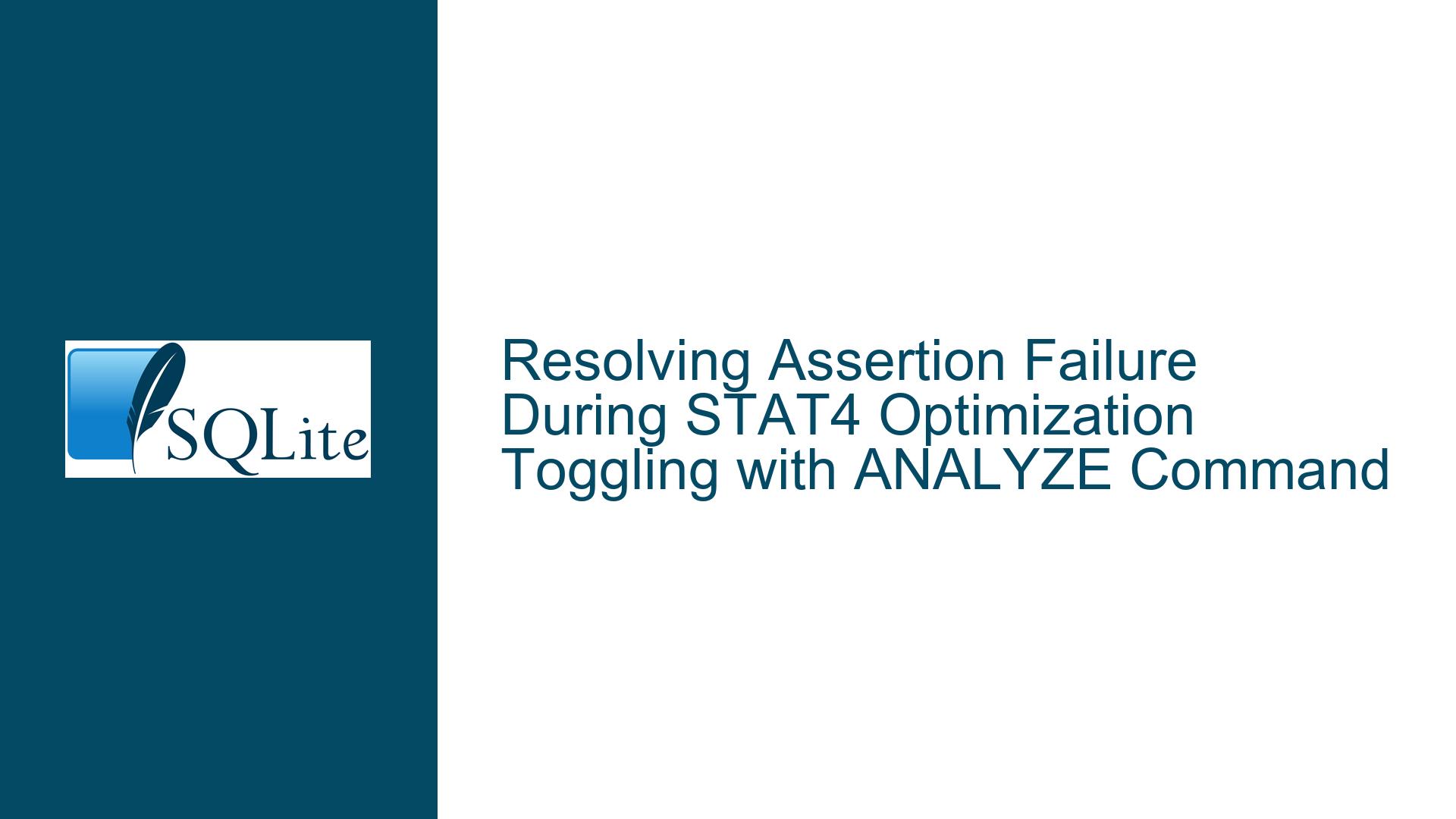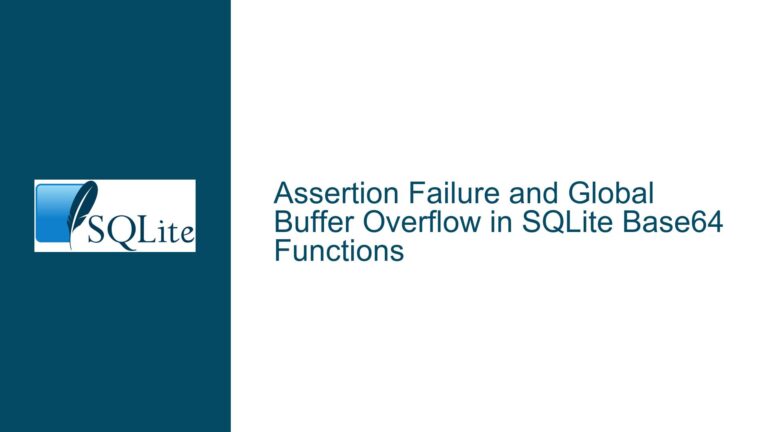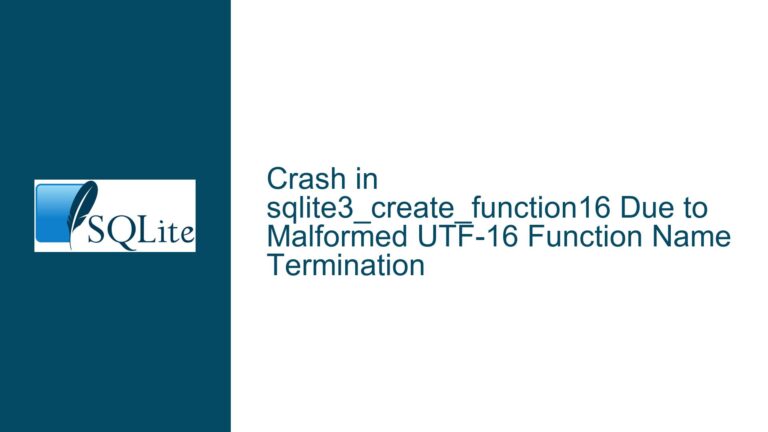Resolving Assertion Failure During STAT4 Optimization Toggling with ANALYZE Command
Understanding the Assertion Failure in STAT4 Optimization During ANALYZE Execution
The core issue involves an assertion failure triggered when enabling or disabling SQLite optimizations during the execution of the ANALYZE command. This failure occurs specifically in environments where the SQLite STAT4 feature is active. STAT4 is an advanced statistics collection mechanism that improves query planner decisions by gathering detailed histogram data about index distributions. The problem manifests as a crash during the ANALYZE phase when optimization flags are toggled using the .testctrl command.
The error message sqlite3VdbeExec: Assertion 'pIn1!=pOut' failed indicates a violation of an internal consistency check in SQLite’s Virtual Database Engine (VDBE). The VDBE is responsible for executing low-level bytecode generated from SQL statements. The assertion ensures that two operands (pIn1 and pOut) in a bytecode operation do not reference the same register, as this could lead to undefined behavior. When STAT4 optimizations are enabled, the ANALYZE command generates bytecode that violates this condition under specific schema configurations.
The schema in the provided example includes a table v1 with two unusual indexes:
i1defined on the same columnc1five times, followed by a computed columnc1 || 2.i2defined on the constant expression1 < 2, which always evaluates toTRUE.
These indexes create edge cases for the query planner and STAT4 statistics collection. When ANALYZE runs, SQLite traverses all indexed columns to gather statistics. The combination of redundant columns (c1 repeated five times in i1), a computed column, and a constant-expression index creates a scenario where temporary registers in the VDBE bytecode may alias (i.e., refer to the same memory location). This aliasing violates the assertion pIn1!=pOut when optimizations are toggled mid-process.
The failure is sensitive to the order of operations:
- Disabling optimizations first (
.testctrl optimizations 0xffffffff) followed byANALYZE, then enabling optimizations (.testctrl optimizations 0x00000000) and runningANALYZEagain. - The second
ANALYZE(with optimizations enabled) triggers the crash. This suggests that STAT4 optimizations introduce bytecode patterns that conflict with prior state changes from the optimization-disabled phase.
The problem is tied to SQLite’s handling of ephemeral statistics tables. When ANALYZE runs, SQLite creates internal temporary tables (e.g., sqlite_stat1, sqlite_stat4) to store histogram data. The VDBE bytecode for populating these tables interacts with index structures in ways that assume certain optimization flags remain stable. Toggling optimizations between ANALYZE runs destabilizes this assumption, leading to register allocation conflicts.
Root Causes of Assertion Failure When Toggling Optimization Flags Involving STAT4
Incorrect Register Allocation in VDBE Bytecode Generation with STAT4
The STAT4 feature requires the query planner to generate additional bytecode for histogram sampling. When optimizations are enabled, SQLite uses aggressive register reuse strategies to minimize memory consumption. However, the presence of redundant or computed columns in indexes (as ini1andi2) can confuse the register allocator. Specifically:- The repeated column
c1in indexi1may cause the bytecode generator to reuse the same register for multiple operations, assuming they are independent. - The computed column
c1 || 2introduces a dependency chain where the output of one operation (c1) is used as input for another (|| 2). If the register allocator assigns the same register for both input and output, it violates thepIn1!=pOutassertion.
- The repeated column
State Pollution Between Optimization Flag Changes
SQLite’s internal optimizations are designed to be set once at compile-time or during initialization. Toggling optimizations at runtime via.testctrlis unconventional and not thoroughly tested in all scenarios. When optimizations are disabled and re-enabled betweenANALYZEcommands, the STAT4 subsystem may retain state from the optimization-disabled phase. This residual state conflicts with the newly enabled optimizations, leading to bytecode that references stale or incorrect register mappings.Constant-Folded Indexes and STAT4 Sampling
The indexi2on1 < 2(a constantTRUEvalue) presents a degenerate case for STAT4. Since all rows in the index evaluate to the same value, the histogram sampling logic may shortcut certain computations. However, the interaction between constant-folded indexes and dynamic optimization toggling can corrupt the VDBE’s register pool. For example, the bytecode for samplingi2might reuse a register that was previously allocated fori1’s computed column.Compile-Time Flags and Debugging Assurances
The user’s compilation flags include-DSQLITE_DEBUG, which enables internal sanity checks like thepIn1!=pOutassertion. These checks are omitted in production builds but are critical for catching logic errors during development. The combination ofSQLITE_DEBUG,SQLITE_ENABLE_STAT4, andSQLITE_ENABLE_CURSOR_HINTSexposes edge cases that would otherwise go unnoticed.
Effective Fixes and Workarounds for STAT4-Related Assertion Failures in SQLite
1. Upgrade to SQLite 3.41 or Later
The SQLite development team addressed this specific issue in versions 3.41 (branch-3.41) and later. The fix involves revising the bytecode generation logic for STAT4 histogram sampling to ensure proper register allocation, even when optimizations are toggled.
Steps:
- Download the latest SQLite amalgamation from sqlite.org/download.
- Replace the existing
sqlite3.candsqlite3.hfiles in your project. - Recompile with the same flags (e.g.,
-DSQLITE_ENABLE_STAT4).
Verification:
After upgrading, re-run the test case:
./sqlite3 < poc
The assertion failure should no longer occur.
2. Disable STAT4 Temporarily
If upgrading is not feasible, disable STAT4 by omitting -DSQLITE_ENABLE_STAT4 from your compile-time flags. This avoids the faulty code path entirely.
Trade-offs:
- Query planner decisions may be less accurate, leading to suboptimal query plans for complex indexes.
- This is a short-term workaround; STAT4 is recommended for databases with skewed data distributions.
3. Avoid Toggling Optimizations at Runtime
The .testctrl optimizations command is intended for internal testing, not production use. Avoid changing optimization flags between ANALYZE commands or other critical operations.
Mitigation Strategies:
- Run
ANALYZEonce with a consistent optimization setting. - If comparing optimization settings, restart the SQLite process between tests to reset internal state.
4. Refactor Index Definitions to Avoid Redundancy
The index i1 in the test case is artificially complex. Redundant columns (c1 repeated five times) and computed columns increase the likelihood of register allocation conflicts.
Revised Schema:
CREATE TABLE v1 (c1);
-- Remove redundant columns; keep one instance of c1 and the computed column.
CREATE INDEX i1 ON v1 (c1, c1 || 2);
-- Replace constant-expression index with a generated column.
ALTER TABLE v1 ADD COLUMN c2 GENERATED ALWAYS AS (1 < 2);
CREATE INDEX i2 ON v1 (c2);
This reduces the complexity of STAT4 sampling and minimizes register pressure.
5. Use Debugging Tools to Diagnose Bytecode Issues
With SQLITE_DEBUG enabled, SQLite provides tools to inspect the VDBE bytecode and register usage.
Steps:
- Enable bytecode tracing:
.eqp trace .trace on - Run the
ANALYZEcommand and examine the output for register assignments. - Look for instances where the same register is used as both input and output (
pIn1==pOut).
Example Output Analysis:
VDBE Program Listing:
0 Trace 0 0 0 sqlite_compileoption_used('STAT4')
...
42 Ne 5 6 83 r[83] = r[5] != r[6]
If registers 5 and 6 alias the same memory location, this indicates a register allocation bug.
6. Apply Patches for STAT4 Bytecode Generation
For users unable to upgrade, manually apply the fix from SQLite’s repository:
Patch Details:
- Revision 95c7af79cf modifies
wherecode.cto ensure distinct registers for STAT4 sampling. - Locate the
sqlite3VdbeAddOp3calls inwhereIndexStatsand verify that output registers do not overlap with inputs.
Manual Code Changes:
In wherecode.c, around line 1500:
// Before patch
pParse->nMem += nColTest + 2;
// After patch
pParse->nMem += nColTest + 3; // Allocate extra register to avoid overlap
Final Recommendations
- Prioritize Upgrading to benefit from official fixes and ongoing improvements.
- Simplify Index Designs to avoid unnecessary complexity that stresses the optimizer.
- Reserve
.testctrlfor Debugging and avoid runtime optimization changes in production.
By addressing the root cause—register allocation conflicts in STAT4 bytecode—and adopting schema best practices, users can eliminate this assertion failure while maintaining optimal query performance.






